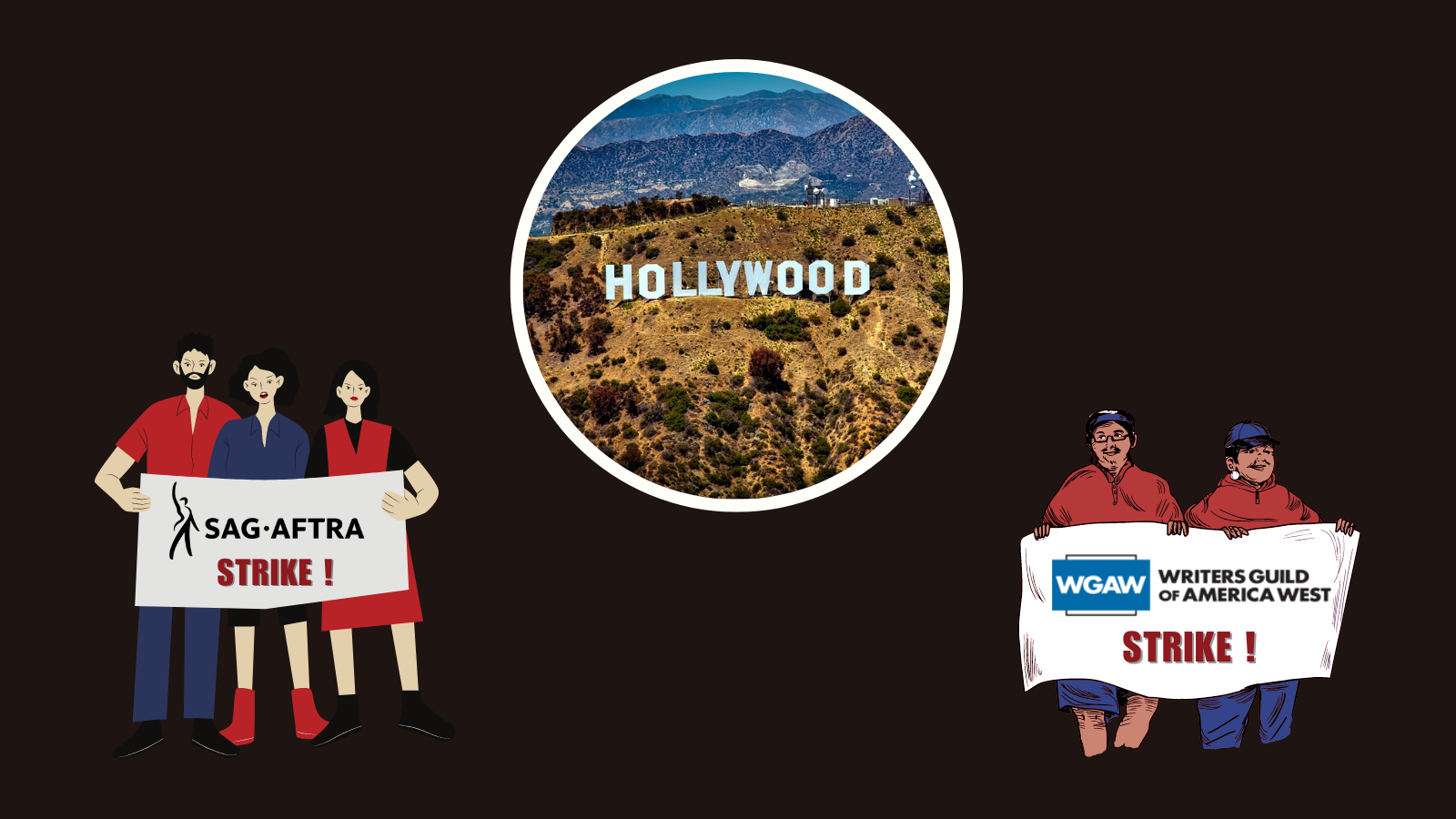Hollywood | Strike | Residual | Artificial Intelligence | WGA | SAG-AFTRA | AMPTP

Hollywood is on a halt due to twin strikes.
Writers, professional performers, and media industry workers are all on strike, calling for fair pay, residual compensation from streaming media, and regulation over the use of Artificial Intelligence (AI).
It has been 100 days since the Writers Guild of America (WGA) — a writers’ association that represents 11,500 screenwriters — went on strike after the ongoing labour dispute with the Alliance of Motion Picture and Television Producers (AMPTP) could not be resolved. No guild member will write any new TV or film scripts as long as the WGA does not vote to end the strike.
AMPTP is the entertainment industry’s official collective bargaining representative that negotiates industry-wide agreements on behalf of hundreds of motion picture and television producers — and represents Hollywood’s big film and television studios such as Sony Pictures, the Walt Disney Company, Warner Bros, Amazon Studios, Apple Studios, Lionsgate, NBCUniversal, Netflix, Paramount Global, Discovery.
WGA is seeking a new contract that ensures “fair pay that reflects the value of their contribution to company success and includes protections to ensure that writing survives as a sustainable profession.”
The strike that started on May 2 was voted in favour by 97.85% of the guild members. “The studios’ responses to our proposals have been wholly insufficient, given the existential crisis writers are facing,” said WGA while announcing the strike.
According to WGA, the companies’ behaviour has created a gig economy inside the union workforce refusing to guarantee any level of weekly employment in episodic television and stonewalling on free work for screenwriters and AI for all writers.
Despite an increased production budget, and an increase in the number of jobs, the actual pay for writers has decreased drastically, shows a WGA bulletin. And one major bone of contention is residual pay which writers (and association of actors and TV/media professionals) think is eroding with the proliferation of streaming platforms whose business model hardly considers residual pay.
Residuals are royalty payments that writers, actors, directors, and other related creatives who contribute to a project receive on a recurring basis even after the project is completed — whenever the creative outputs are commercially reused, for instance, reruns of a film/TV show or release on streaming platforms.
In its pattern of demands, WGA has sought to standardise the residual terms for features whether released theatrically or on streaming.
Writers are also threatened by the possibility of studios using generative AI tools, such as ChatGPT, and have sought to regulate AI or similar tech-produced materials — that AI can’t write or rewrite literary material; cannot be used as source material; and cannot be used to train AI.
The WGA’s proposals regarding AI were rejected by the AMPTP during negotiations prior to the strike.
Now, following the WGA, Screen Actors Guild - American Federation of Television and Radio Artists (SAG-AFTRA) that represents approximately 160,000 actors, announcers, broadcast journalists, dancers, DJs, news writers, news editors, program hosts, puppeteers, recording artists, singers, stunt performers, voiceover artists, and other media professionals has also joined the strike — beginning July 14 with similar demands.
“We are all going to be in jeopardy of being replaced by machines and big business who care more about Wall Street than you and your family,” Fran Drescher, president of SAG-AFTRA, said while announcing the strike a week ago.
SAG-AFTRA is negotiating for a pay increase to keep up with the inflation and a comprehensive plan for actors to participate in streaming revenue, as the current business model erodes their residual income.
Earlier, AMPTP had rejected SAG-AFTRA’s new media revenue-sharing proposal which would allow the casts to share the generated revenue when their performances are exhibited on streaming platforms.
The union is also fighting against the possibility of an AI explosion in the industry to prevent digital human simulations of voice, image, and performances with the use of generative AI. During the pre-strike negotiation with AMPTP, its proposal featured ‘a groundbreaking AI proposal that protects performers’ digital likenesses’ which is now becoming highly controversial.
Duncan Crabtree-Ireland, SAG-AFTRA’s chief negotiator explained that the groundbreaking proposal was about companies scanning background performers for a one-day pay, and securing ownership and rights over the scan, their image, and their likeness for eternity, without consent and compensation.
However, AMPTP denied the claims stating that the proposal was only for use in a particular project, and use outside of the agreed project would be subject to consent, bargaining, and further payment.
The strike has halted the production of some highly anticipated movies disrupting jobs and earnings for many US and international film workers.
The last time, the WGA had opted to strike was in 2007/08 following the financial crisis, which disrupted work for 100 days and cost the Californian economy, where Hollywood is based, $2.1 billion. The actors on the other hand had not protested since the strike in 1980 — which also occurred as a result of a breakdown in labour contract negotiations between the two unions.
Read More Stories
Kathmandu’s decay: From glorious past to ominous future
Kathmandu: The legend and the legacy Legend about Kathmandus evolution holds that the...
Kathmandu - A crumbling valley!
Valleys and cities should be young, vibrant, inspiring and full of hopes with...
Understanding federal grants in fiscal federalism
Local budgets are where democracy meets the daily lives of citizensthis is a...